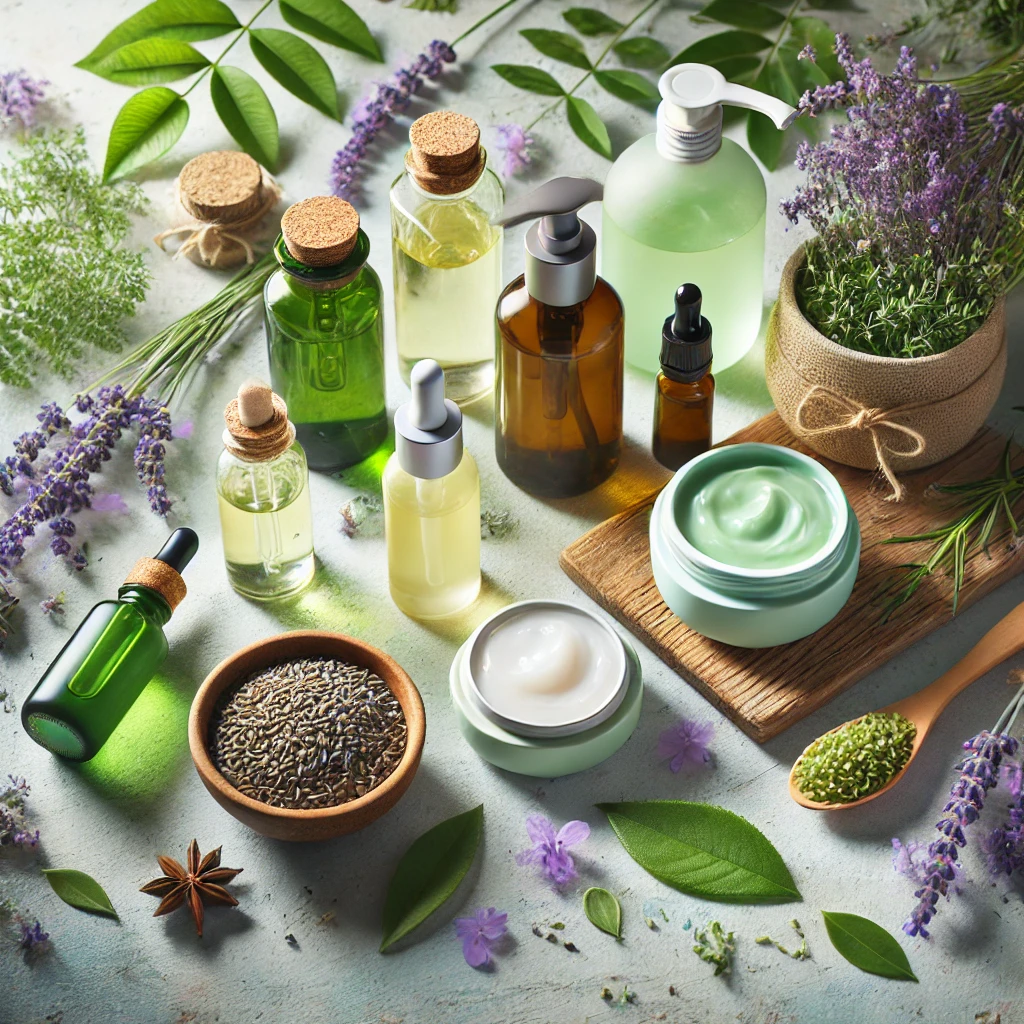
Skincare has always been an essential part of self-care and beauty routines worldwide. However, in recent years, the beauty industry has undergone a major transformation. Consumers are increasingly prioritizing health-conscious choices, leading to a surge in demand for natural and organic skincare products. With concerns over chemical-laden cosmetics, parabens, and artificial ingredients, many people are embracing skincare solutions that harness the power of nature.
But what exactly does “natural” and “organic” skincare mean? How do these products compare to conventional skincare? And what benefits can they bring to your skin? In this comprehensive guide, we will explore the rise of natural skincare, key ingredients, benefits, how to choose the best products, and ways to incorporate them into your routine effectively.
Chapter 1: Understanding Natural & Organic Skincare

1.1 What is Natural Skincare?
Natural skincare products are formulated with ingredients derived from nature, such as plants, minerals, and naturally occurring compounds. These products avoid synthetic chemicals, artificial fragrances, and toxic preservatives that may harm the skin over time. Natural skincare aims to nourish and rejuvenate the skin using botanical extracts, essential oils, and herbal infusions.
1.2 What is Organic Skincare?
Organic skincare takes natural beauty to the next level by ensuring that the ingredients used are grown and harvested without synthetic pesticides, herbicides, or genetically modified organisms (GMOs). These products carry certifications like USDA Organic, Ecocert, and COSMOS, signifying their commitment to purity, sustainability, and ethical sourcing.
1.3 The Difference Between Natural and Organic
While both terms are often used interchangeably, there is a crucial distinction:
- Natural skincare focuses on ingredients derived from nature but may still contain some synthetic elements.
- Organic skincare guarantees that ingredients meet strict organic farming standards and do not contain chemical additives.
Chapter 2: Why Choose Natural and Organic Skincare?

2.1 Free from Harsh Chemicals
One of the main reasons people switch to natural skincare is to avoid harsh chemicals like parabens, sulfates, and phthalates. These ingredients are often linked to skin irritation, allergies, and even long-term health risks.
2.2 Gentle on the Skin
Natural and organic products are less likely to cause irritation or allergic reactions, making them ideal for sensitive skin types. They work in harmony with the skin’s natural barrier, rather than stripping it of essential oils.
2.3 Rich in Nutrients
Plant-based ingredients are packed with antioxidants, vitamins, and essential fatty acids that help combat aging, inflammation, and dryness. Popular natural ingredients like aloe vera, chamomile, and green tea are renowned for their skin-healing properties.
2.4 Environmentally Friendly
Unlike conventional skincare, which often involves harmful production processes and plastic packaging, organic skincare brands prioritize sustainability, cruelty-free practices, and biodegradable packaging.
2.5 Ethical and Cruelty-Free
Many natural and organic brands advocate against animal testing and support fair trade practices, ensuring ethical sourcing of ingredients.
Chapter 3: Key Ingredients in Natural & Organic Skincare
3.1 Aloe Vera: The Ultimate Soother
Aloe vera is a powerhouse ingredient known for its hydrating, anti-inflammatory, and healing properties. It helps calm redness, sunburn, and irritation while deeply moisturizing the skin.
3.2 Coconut Oil: Nature’s Moisturizer
Rich in fatty acids, coconut oil is an excellent natural emollient. It helps lock in moisture, repair the skin barrier, and protect against environmental damage.
3.3 Green Tea Extract: A Potent Antioxidant
Green tea is packed with polyphenols and catechins that fight free radicals, reduce inflammation, and slow down signs of aging.
3.4 Jojoba Oil: The Closest Match to Skin’s Natural Oils
Jojoba oil mimics the skin’s natural sebum, making it a fantastic non-comedogenic moisturizer that balances oily and acne-prone skin.
3.5 Rosehip Oil: The Anti-Aging Hero
Rosehip oil is rich in Vitamin C and essential fatty acids, helping to brighten skin, reduce hyperpigmentation, and improve elasticity.
3.6 Chamomile: The Ultimate Calming Agent
Chamomile has anti-inflammatory and antibacterial properties, making it ideal for soothing sensitive or acne-prone skin.
Chapter 4: How to Transition to Natural Skincare
Switching to a natural skincare routine requires patience and the right approach. Here’s how to make the transition smoothly:
4.1 Start with the Basics
Begin by replacing essential products such as cleansers, moisturizers, and serums with natural alternatives. Prioritize products labeled “certified organic” to ensure quality.
4.2 Patch Test New Products
Even natural ingredients can trigger reactions in some individuals. Always perform a patch test before introducing a new product to your routine.
4.3 Give Your Skin Time to Adjust
When transitioning, your skin may go through a detox phase, where breakouts or increased oiliness can occur. This is normal and temporary.
4.4 Look for Eco-Friendly Packaging
Supporting brands that use sustainable packaging helps reduce waste and environmental impact.
4.5 DIY Natural Skincare Recipes
If you love homemade solutions, try making your own face masks, scrubs, and toners using kitchen ingredients like honey, turmeric, and avocado.
Chapter 5: Common Myths About Natural Skincare
Myth #1: Natural Skincare is Less Effective
While some believe that natural products lack potency, the truth is that plant-based ingredients are highly effective and work in synergy with the skin.
Myth #2: All Natural Products Are Safe
Not all natural ingredients are suitable for everyone. For example, essential oils can be irritating in high concentrations.
Myth #3: Natural Skincare is Expensive
Many people assume that organic skincare is costly, but there are plenty of affordable natural brands that provide high-quality products.
Myth #4: Natural Skincare Works Instantly
Unlike chemical-based skincare, natural products work gradually, but they deliver long-lasting results without harming the skin.
Chapter 6: Best Natural & Organic Skincare Brands
6.1 What to Look for in a Natural Skincare Brand
When choosing a natural skincare brand, it’s essential to look for:
- Certified Organic Ingredients – Ensure products are labeled with USDA Organic, Ecocert, or similar certifications.
- Transparent Ingredient List – Brands should provide a clear list of natural ingredients without hidden chemicals.
- Sustainable Packaging – Opt for brands using recyclable, biodegradable, or refillable packaging.
- Cruelty-Free Practices – Ethical brands avoid animal testing and support sustainability efforts.
6.2 Top Organic Skincare Brands to Try
1. Dr. Hauschka
Known for biodynamic farming and holistic skincare, Dr. Hauschka provides plant-based, effective skincare solutions.
2. Tata Harper
Luxury meets nature with Tata Harper’s farm-to-face skincare approach, offering highly effective organic formulas.
3. Herbivore Botanicals
A minimalist brand featuring vegan, cruelty-free products with clean, botanical ingredients.
4. Pai Skincare
Ideal for sensitive skin, Pai Skincare focuses on organic solutions free from irritants.
5. True Botanicals
Science-backed natural skincare with clinically proven results, free from toxins and synthetic fillers.
Chapter 7: Expert Tips for Achieving Naturally Glowing Skin
7.1 Follow a Consistent Skincare Routine
A natural glow doesn’t happen overnight. Establishing a skincare regimen with cleansing, exfoliation, hydration, and sun protection is key.
7.2 Stay Hydrated and Eat a Nutrient-Rich Diet
Your skin reflects what you consume. Incorporate antioxidant-rich foods, drink plenty of water, and avoid excessive processed foods.
7.3 Use Facial Oils and Serums
Botanical oils like rosehip, argan, and marula help lock in moisture and improve skin elasticity naturally.
7.4 Protect Your Skin from Sun Damage
Natural sunscreens with zinc oxide and titanium dioxide provide safe sun protection without harmful chemicals.
7.5 Prioritize Sleep and Stress Management
Lack of sleep and high stress can dull the complexion. Practice mindfulness, get enough rest, and engage in self-care activities.
7.6 Try DIY Skincare Recipes
Homemade masks and scrubs using ingredients like oatmeal, yogurt, honey, and turmeric can offer affordable and effective skincare solutions.
7.7 Exercise Regularly to Boost Circulation
Sweat detoxifies the skin and improves blood circulation, contributing to a radiant complexion.
Conclusion
Switching to natural and organic skincare is more than just a trend—it’s a commitment to healthy skin, sustainability, and conscious beauty choices. By understanding the ingredients, benefits, and best practices, you can create a skincare routine that nourishes your skin without exposure to harmful chemicals.

